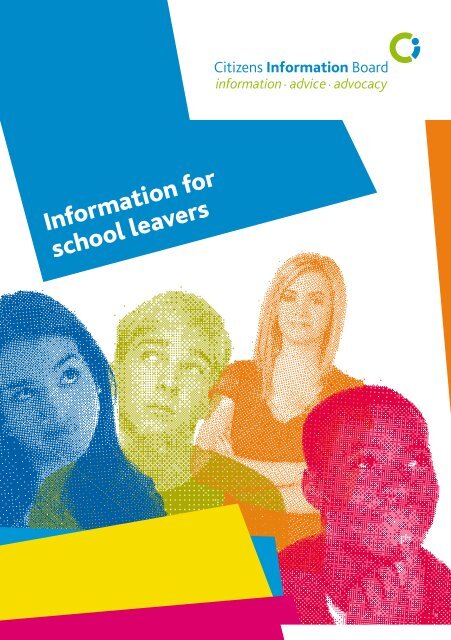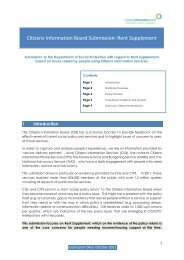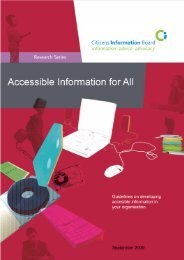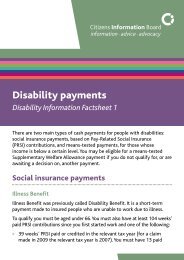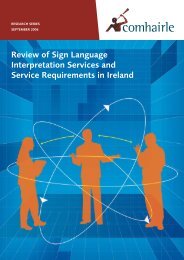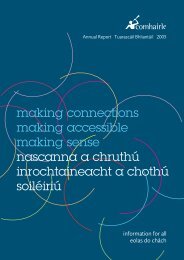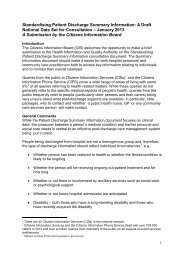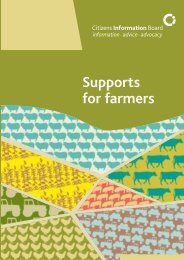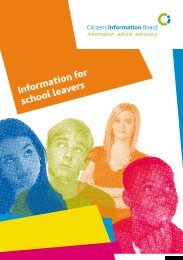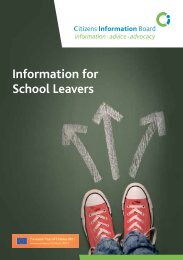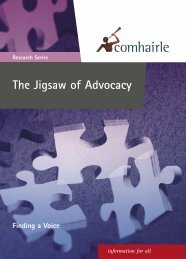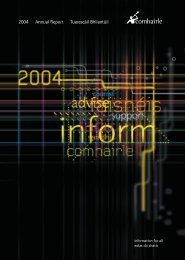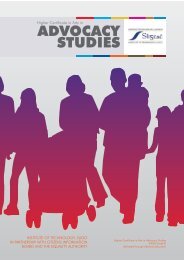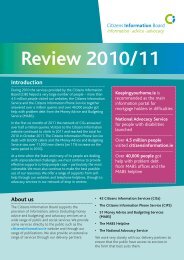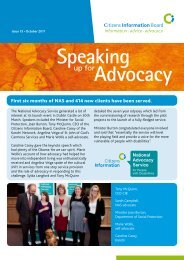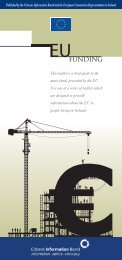Information for School Leavers 2012 (pdf) - Citizens Information Board
Information for School Leavers 2012 (pdf) - Citizens Information Board
Information for School Leavers 2012 (pdf) - Citizens Information Board
You also want an ePaper? Increase the reach of your titles
YUMPU automatically turns print PDFs into web optimized ePapers that Google loves.
<strong>In<strong>for</strong>mation</strong> <strong>for</strong><br />
school leavers
Contents<br />
Leaving school 3<br />
Further education and training 5<br />
Employment 14<br />
Social welfare 25<br />
At what age can I…? 27<br />
Further in<strong>for</strong>mation 30<br />
This leaflet is published by the <strong>Citizens</strong> <strong>In<strong>for</strong>mation</strong> <strong>Board</strong><br />
as a brief guide <strong>for</strong> young people leaving school. It deals<br />
with some of the practical questions about education and<br />
employment that you may have at this time.<br />
The <strong>Citizens</strong> <strong>In<strong>for</strong>mation</strong> <strong>Board</strong> is the national agency<br />
responsible <strong>for</strong> supporting the provision of in<strong>for</strong>mation,<br />
advice and advocacy on social services and <strong>for</strong> the provision<br />
of the Money Advice and Budgeting Service.<br />
You can get in<strong>for</strong>mation on your rights, entitlements and<br />
available services on citizensin<strong>for</strong>mation.ie. You can also get<br />
in<strong>for</strong>mation on all the topics covered in this guide from the<br />
network of <strong>Citizens</strong> <strong>In<strong>for</strong>mation</strong> Centres and from the national<br />
<strong>Citizens</strong> <strong>In<strong>for</strong>mation</strong> Phone Service – call: 0761 07 4000.<br />
March <strong>2012</strong><br />
2 / Call: 0761 07 4000
Leaving school<br />
Leaving school can be an exciting time with many<br />
opportunities and possibilities ahead of you. Generally,<br />
during your last year at secondary school, career guidance<br />
teachers will in<strong>for</strong>m and advise you of the available<br />
options. They will help guide you through these options to<br />
choose the one that is best <strong>for</strong> you.<br />
In this booklet we look at some of the options <strong>for</strong> further<br />
education and training after school. If you get a job after<br />
you leave school, you need to know about your employment<br />
rights so we cover, <strong>for</strong> example, how much you should be<br />
paid, what holidays and breaks you are entitled to and what<br />
taxes you have to pay.<br />
Personal Public Service Number<br />
On leaving school, and be<strong>for</strong>e going to further education,<br />
training or starting your first job, you should ensure that you<br />
have your Personal Public Service (PPS) Number. It is your<br />
unique number <strong>for</strong> all dealings with employers and with the<br />
public service, including social welfare, tax, education and<br />
health services.<br />
You probably know your PPS Number already – it is used on<br />
Child Benefit documents, Drugs Payment Scheme cards and<br />
other official documents. If you do not know your number or<br />
you want to apply <strong>for</strong> one, contact your local social welfare<br />
office (listed on welfare.ie).<br />
citizensin<strong>for</strong>mation.ie / 3
Managing your money<br />
If you are planning to open a bank account, get a loan or<br />
start saving, the National Consumer Agency website nca.ie<br />
has in<strong>for</strong>mation on the options available. It also has an online<br />
budget planner and loan calculator.<br />
If you are finding it difficult to manage your money and<br />
keep up with bills or debts, the Money Advice and Budgeting<br />
Service (MABS) can advise you on the best way to use your<br />
money and can help you deal with any debts you have.<br />
You can find useful guides and in<strong>for</strong>mation on the MABS<br />
website, mabs.ie, or you can call the MABS helpline on<br />
0761 07 2000 to speak with an adviser.<br />
Accommodation<br />
You can leave home at the age of 18 – or at 16 if your<br />
parents consent. If you are planning to leave home,<br />
make sure to think it through and work out how much you<br />
can af<strong>for</strong>d to spend on rent. Don’t <strong>for</strong>get to allow <strong>for</strong> bills<br />
like electricity and heating and to budget <strong>for</strong> food and other<br />
expenses. There may be things you will need to buy <strong>for</strong> your<br />
new home even if it is already furnished. See mabs.ie <strong>for</strong><br />
advice on planning a weekly budget.<br />
Threshold provides in<strong>for</strong>mation about what you should know<br />
be<strong>for</strong>e you sign a lease and has advice centres that can help<br />
if you need advice about your rights as a tenant. See the<br />
website threshold.ie <strong>for</strong> contact details and opening hours.<br />
4 / Call: 0761 07 4000
Further education and training<br />
As a school-leaver, you have many opportunities<br />
to gain further education, skills and qualifications that<br />
can help you get a job.<br />
If you intend to continue to third-level education in<br />
Ireland, you must apply through the Central Applications<br />
Office (CAO). Offers of places on courses are decided by<br />
Leaving Certificate results, with a percentage of places<br />
reserved <strong>for</strong> students who have a disability or are from a<br />
disadvantaged background – see “Third-level education”<br />
below.<br />
Post Leaving Certificate (PLC) courses are available <strong>for</strong><br />
school-leavers who want to develop vocational and<br />
technological skills. These courses take place in schools<br />
and colleges nationwide.<br />
Other options <strong>for</strong> further education and training include<br />
FÁS, the Vocational Training Opportunities Scheme (VTOS)<br />
and the Youthreach Programme. The national learners’<br />
database qualifax.ie provides in<strong>for</strong>mation on the different<br />
courses available.<br />
citizensin<strong>for</strong>mation.ie / 5
Financial support<br />
There are several financial assistance schemes <strong>for</strong> students in<br />
further and higher education.<br />
<strong>Citizens</strong>in<strong>for</strong>mation.ie and studentfinance.ie provide<br />
in<strong>for</strong>mation on course fees and details of eligibility<br />
requirements <strong>for</strong> free fees. You (or the person paying your<br />
fees) may be able to get tax relief on the tuition fees and<br />
Student Contribution.<br />
Student grants<br />
You may apply <strong>for</strong> a student grant if you are planning<br />
to take:<br />
• An approved full-time course at third level<br />
• An approved full-time PLC course<br />
• A course leading to a Higher Certificate or Ordinary<br />
Bachelor Degree in an Institute of Technology<br />
The student grant has two elements: a maintenance grant and<br />
a fee grant. A maintenance grant is a contribution toward your<br />
living costs. A fee grant can cover all or part of your fees and<br />
Student Contribution and the costs of necessary field trips.<br />
Family and/or personal income will be assessed when you apply<br />
<strong>for</strong> a student grant but there are also other conditions.<br />
If you are not a national of an EU or an EEA member state, you<br />
will need to fulfil certain immigration conditions. There are also<br />
residence requirements to be eligible <strong>for</strong> a student grant.<br />
6 / Call: 0761 07 4000
The rate of the maintenance grant depends on your<br />
circumstances. If you live more than 45 kilometres from<br />
your college you get a higher “non-adjacent” rate than<br />
someone living closer. You may qualify <strong>for</strong> a partial grant if<br />
your family income is above the limit <strong>for</strong> a full grant. There<br />
is an extra grant <strong>for</strong> disadvantaged students which tops up<br />
the ordinary grant. You may qualify <strong>for</strong> this if you or your<br />
parents are getting certain social welfare payments or taking<br />
part in certain programmes (see citizensin<strong>for</strong>mation.ie <strong>for</strong><br />
in<strong>for</strong>mation). In <strong>2012</strong> this extra grant is €2,890 <strong>for</strong> students<br />
getting the non-adjacent rate (€5,915 in total) and €1,160<br />
<strong>for</strong> students getting the adjacent rate (€2,375 in total).<br />
Ordinary maintenance grant rates <strong>for</strong> <strong>2012</strong><br />
Rates (in euro) Non-adjacent rate Adjacent rate<br />
Full maintenance 3,025 1,215<br />
Part maintenance (75%) 2,270 910<br />
Part maintenance (50%) 1,515 605<br />
Part maintenance (25%) 755 305<br />
If you think you may be eligible <strong>for</strong> a student grant, you<br />
should register online through studentfinance.ie as soon as<br />
the application process opens in May <strong>2012</strong>. The new single<br />
grant-awarding authority – Student Universal Support Ireland<br />
(SUSI) – will handle all new applications.<br />
If your application is provisionally approved on initial<br />
assessment, SUSI will send you a personalised list of the<br />
documents that you need to provide. You should send these<br />
documents (photocopies, not originals) back to SUSI.<br />
Make sure to register your grant application and send your<br />
supporting documents as early as possible. Do not wait until<br />
you get a college place, as this will delay the decision on<br />
awarding a grant.<br />
citizensin<strong>for</strong>mation.ie / 7
Third-level education<br />
You can apply <strong>for</strong> full-time undergraduate courses through the<br />
Central Applications Office (CAO). The CAO website and handbook<br />
provide detailed in<strong>for</strong>mation on how to apply. Visit cao.ie.<br />
The Higher Education Access Route (HEAR) admissions<br />
scheme allocates a number of third-level places on a reduced<br />
points basis to school-leavers from socially disadvantaged<br />
backgrounds. The Disability Access Route to Education (DARE)<br />
offers places on a reduced points basis to school-leavers with<br />
disabilities. You apply online through the CAO <strong>for</strong> both schemes.<br />
For more in<strong>for</strong>mation see accesscollege.ie.<br />
Most undergraduate students attending publicly funded<br />
third-level courses do not have to pay fees, but there is an<br />
annual Student Contribution – all or part of which may be<br />
covered by a fee grant. The maximum Student Contribution is<br />
€2,250 <strong>for</strong> the year <strong>2012</strong>/2013. If your family pays student<br />
contributions <strong>for</strong> more than one student in a year, tax relief can<br />
be claimed on the second and subsequent contributions. Visit<br />
citizensin<strong>for</strong>mation.ie <strong>for</strong> more in<strong>for</strong>mation.<br />
Post Leaving Cert (PLC) courses<br />
A Post-Leaving Certificate (PLC) course can help you develop<br />
skills to get a job or to go into further education and training.<br />
PLC courses are provided in schools, colleges and community<br />
education centres nationwide. The courses are full-time and last<br />
<strong>for</strong> one year. They offer a mixture of academic study and work<br />
experience and cover a wide range of disciplines.<br />
8 / Call: 0761 07 4000
The national learners’ database, qualifax.ie, provides<br />
in<strong>for</strong>mation on the different courses available. You can apply<br />
directly to the school or college offering the course.<br />
The qualification you get at the end of your training will<br />
depend on the type of course you have chosen. Many<br />
PLC courses offer Further Education and Training<br />
Awards Council (FETAC) accreditation at Level 5, while other<br />
more advanced courses may offer FETAC Level 6, which can<br />
lead to further studies at third level. Other qualifications<br />
such as City and Guilds are also available.<br />
FÁS/SOLAS<br />
FÁS (Foras Áiseanna Saothair) is Ireland’s National Training<br />
Authority. Many of its courses are suitable <strong>for</strong><br />
school-leavers. FÁS is being replaced by a new education and<br />
training authority called SOLAS. Participants on FÁS courses<br />
will not be affected by the change and will continue their<br />
courses under SOLAS.<br />
FÁS can advise you on the training and employment<br />
programmes that suit you best. You can contact your local<br />
FÁS office, call Freephone 1800 611 116, or visit the website<br />
at fas.ie.<br />
You will only get a training allowance while on a FÁS course if<br />
you are already entitled to a qualifying social welfare payment,<br />
or if you are aged under 18 and attending a Community<br />
Training Centre. The rate of the training allowance is linked to<br />
your age. In <strong>2012</strong>, if you are 16 or 17 years of age the rate is<br />
€40 per week. If you are 18 or over, it is €188.<br />
citizensin<strong>for</strong>mation.ie / 9
However, if you are getting a higher social welfare payment<br />
be<strong>for</strong>e starting the course, your training allowance will match<br />
that higher rate.<br />
Traineeship Programme<br />
You can get training, experience and a qualification by taking<br />
part in the FÁS Traineeship Programme. It involves both<br />
learning in a training centre and working with an employer. It<br />
usually lasts between 20 and 40 weeks but this depends on<br />
the course. You can train in a range of different areas – check<br />
with FÁS <strong>for</strong> details.<br />
Statutory Apprenticeship Training<br />
If you are interested in learning both on the job and in<br />
the classroom, you can do an apprenticeship in a trade such<br />
as engineering, construction, motor, electrical, furniture or<br />
printing.<br />
An apprenticeship generally lasts <strong>for</strong> four years, about 40<br />
weeks of which will be in off-the-job training. During off-thejob<br />
training, FÁS, or in some cases the employer, will<br />
pay you a weekly training allowance. While you are training<br />
on the job, your employer will pay you a recommended<br />
apprenticeship wage.<br />
Work Placement Programme<br />
If you are unemployed, you can apply to take part in the<br />
Work Placement Programme, which provides full-time work<br />
experience <strong>for</strong> up to nine months. It is unpaid and voluntary<br />
but if you have been getting a social welfare payment <strong>for</strong><br />
three months you may be able to continue getting it while<br />
on the placement.<br />
To apply, you must be registered with FÁS and let FÁS know<br />
that you are interested in taking part. You can do this at<br />
10 / Call: 0761 07 4000
any FÁS Employment Services Office. If you are already<br />
registered with FÁS, you can register your interest in the<br />
Work Placement Programme on Freephone 1800 611 116 or<br />
(046) 973 8000.<br />
JobBridge<br />
JobBridge (the National Internship Scheme) provides work<br />
experience opportunities <strong>for</strong> unemployed people. The scheme<br />
is aimed at people who have been either getting a jobseeker’s<br />
payment or signing <strong>for</strong> credits <strong>for</strong> at least three months.<br />
If you take part in the scheme, you will work with a host<br />
organisation <strong>for</strong> between six and nine months.You can keep<br />
your social welfare payment and get an extra €50 per week.<br />
JobBridge is administered by FÁS employment services and<br />
programmes, which have now transferred to the Department<br />
of Social Protection.<br />
Youthreach<br />
The Youthreach programme provides opportunities <strong>for</strong> basic<br />
education, personal development, vocational training and<br />
work experience if you are aged 15 to 20 and have left school<br />
without <strong>for</strong>mal qualifications. The course is free and trainees<br />
aged 16 or over get a weekly allowance equal to the FÁS<br />
training allowance.<br />
Once you have completed a Foundation Programme, you<br />
may continue to a Progression Programme leading to the<br />
Leaving Certificate Applied course, a higher-level FETAC<br />
award or other skills training. Contact your local Youthreach<br />
centre <strong>for</strong> more in<strong>for</strong>mation. Centres are listed on the<br />
Youthreach website, youthreach.ie.<br />
citizensin<strong>for</strong>mation.ie / 11
Back to Education Allowance<br />
The Back to Education Allowance scheme may help you do a<br />
full-time course at second or third level if you are getting a<br />
social welfare payment. It is intended <strong>for</strong> participants over the<br />
age of 21 but if you are over 18 you may be eligible if you are<br />
getting Disability Allowance or Blind Pension (or if you have<br />
been out of education <strong>for</strong> at least two years and are getting a<br />
jobseeker’s payment or One-Parent Family Payment).<br />
You must have been getting the payment <strong>for</strong> at least three<br />
months to qualify <strong>for</strong> a second-level course or 9–12 months<br />
<strong>for</strong> a third-level course. If the payment is immediately<br />
followed by certain types of courses then that time may also<br />
count towards the qualifying period.<br />
The allowance is paid at a weekly rate that is the same as the<br />
maximum personal rate of the social welfare payment that<br />
qualifies you to take part. It is payable <strong>for</strong> the duration of the<br />
course and it essentially replaces your existing social welfare<br />
income. An additional €300 Cost of Education Allowance is<br />
paid each year.<br />
You cannot get the maintenance element of a student grant<br />
if you are getting a Back to Education Allowance, but you<br />
may qualify <strong>for</strong> the fee element of the grant – see above.<br />
Part-time Education Option<br />
If you are getting Jobseeker’s Allowance or Jobseeker’s<br />
Benefit there is a part-time education option. This means<br />
that you can keep your existing payment and related<br />
benefits while you attend a part-time course that is likely<br />
to help you get a job.<br />
12 / Call: 0761 07 4000
To qualify, you must get the permission of your local social<br />
welfare office and continue to satisfy the conditions of being<br />
available <strong>for</strong> and genuinely seeking employment. If you<br />
are offered work while on the course you will be expected<br />
to accept the job offer. You can be any age and may be<br />
unemployed <strong>for</strong> any length of time be<strong>for</strong>e starting a parttime<br />
course of education; there are no specific eligibility<br />
criteria <strong>for</strong> the Part-time Education Option.<br />
Contact your local social welfare office to apply. You can find<br />
the contact details <strong>for</strong> your local social welfare office on<br />
welfare.ie.<br />
Back to Education Initiative<br />
You may be able to attend a part-time course under the Back<br />
to Education Initiative (BTEI). BTEI courses are offered in a<br />
wide range of disciplines at different levels (FETAC Levels<br />
1–6). There may be a fee, depending on your circumstances.<br />
You may be entitled to a training allowance if you are eligible<br />
<strong>for</strong> Youthreach. Contact your local VEC <strong>for</strong> more in<strong>for</strong>mation<br />
or see the list of courses on qualifax.ie.<br />
citizensin<strong>for</strong>mation.ie / 13
Employment<br />
Income tax<br />
If you get a job, you should notify the Revenue<br />
Commissioners as soon as possible. Fill in Form 12A<br />
(Application <strong>for</strong> a Certificate of Tax Credits and Standard<br />
Rate Cut-Off Point), which you can get from your employer<br />
or download from revenue.ie. You will need your own PPS<br />
Number, your employer’s PAYE Registered Number and tax<br />
unit number.<br />
Revenue will send you a Certificate of Tax Credits and<br />
Standard Rate Cut-Off Point and also tell your employer<br />
what your total tax credits are and what tax you have to pay.<br />
All workers have tax credits that reduce the amount of tax<br />
they have to pay. A single person has a Personal Credit of<br />
€1,650 and a separate PAYE Credit, also of €1,650, <strong>for</strong> the<br />
tax year January to December <strong>2012</strong>. If you are single, your<br />
tax is calculated at the standard rate of 20% of your earnings<br />
below €32,800 and the higher rate of 41% on the balance.<br />
This gives you your gross tax liability. Your tax credits are<br />
then subtracted from this figure to give the amount of tax<br />
you will pay. The tax you pay is spread over the tax year so<br />
that you get approximately the same wages each week.<br />
Other reliefs can reduce your income tax, <strong>for</strong> example,<br />
if you pay college fees or medical expenses. For<br />
more in<strong>for</strong>mation on tax reliefs see revenue.ie or<br />
citizensin<strong>for</strong>mation.ie.<br />
14 / Call: 0761 07 4000
Emergency tax<br />
If you don’t apply <strong>for</strong> a Certificate of Tax Credits and<br />
Standard Rate Cut-Off Point when you start work, your<br />
employer will deduct tax on an emergency basis until your<br />
tax details arrive from Revenue. This means that you will<br />
get a temporary tax credit <strong>for</strong> the first month but after four<br />
weeks the tax will start increasing to the highest rate and<br />
you will be paying more tax than you need to. If this happens<br />
you can apply <strong>for</strong> a refund of any overpayment – contact<br />
your regional Revenue office.<br />
If I start work later in the tax year what will my tax<br />
position be?<br />
If you start work during the tax year, your tax credit will be<br />
the same amount but it will be spread over a shorter period<br />
and you will probably have less tax deducted <strong>for</strong> that year.<br />
If you start work late in the tax year, you may not have to<br />
pay any tax that year because your tax credit may be greater<br />
than your income.<br />
What is PRSI?<br />
PRSI is Pay Related Social Insurance. You pay regular<br />
contributions from your wages to the Social Insurance Fund.<br />
These contributions entitle you to social welfare benefits<br />
such as payments when you are ill or unemployed and a<br />
State pension when you retire.<br />
citizensin<strong>for</strong>mation.ie / 15
How much PRSI will I pay?<br />
If you are an employee and you earn less than €352 per<br />
week in <strong>2012</strong>, you don’t pay PRSI but your employer pays<br />
a contribution on your behalf and you are covered <strong>for</strong> all<br />
benefits. If you earn over €352 per week, you pay nothing<br />
on the first €127 and 4% on the rest. If you earn less than<br />
€38 per week, you pay no PRSI and you are covered only <strong>for</strong><br />
Occupational Injuries Benefits.<br />
How will I know my employer is paying my PRSI?<br />
You should get a payslip with your wages which<br />
indicates the tax and PRSI that are deducted from<br />
your wages. At the end of the tax year you should get a Form<br />
P60 which indicates how much you earned, how much tax,<br />
Universal Social Charge and PRSI you paid and the number<br />
and class of PRSI contributions.<br />
This is an important document which you should keep. If, <strong>for</strong><br />
example, you have paid too much tax, the in<strong>for</strong>mation will be<br />
required by the tax office when you go to claim tax back. If<br />
there is any reason to doubt that your employer has sent the<br />
tax and PRSI deducted to the Revenue Commissioners, check<br />
with the PRSI Records Section of the Department of Social<br />
Protection, Tel: (01) 471 5898 or Lo-call 1890 690 690.<br />
16 / Call: 0761 07 4000
What is the Universal Social Charge?<br />
The Universal Social Charge is a tax payable on your gross<br />
income. You are liable to pay the Universal Social Charge if<br />
your gross income is over €10,036 in a year. Scholarships,<br />
student grants, Department of Social Protection (social<br />
welfare) payments, similar payments (<strong>for</strong> example, Community<br />
Employment schemes and Back to Education Allowance) and<br />
income on which DIRT has been paid are exempt.<br />
Universal Social Charge rates<br />
Aged under 70<br />
Income up to €10,036 2%<br />
Income from €10,036.01 to €16,016 4%<br />
Income above €16,016 7%<br />
Self-employed income above €100,000 3%<br />
Aged 70 and over or a medical card holder<br />
Income up to €10,036 2%<br />
Income above €10,036 4%<br />
Self-employed income above €100,000 3%<br />
Your employer is responsible <strong>for</strong> deducting the Universal<br />
Social Charge from your salary and paying it to Revenue on<br />
your behalf.<br />
citizensin<strong>for</strong>mation.ie / 17
Terms and conditions of employment<br />
What should I know from my employer about the job?<br />
Under the Terms of Employment Act 1994, your employer<br />
should in<strong>for</strong>m you in writing of the terms and conditions of the<br />
job. This should include:<br />
• Job title or nature of the work<br />
• The date the job is to start<br />
• The rate of pay<br />
• Whether you will be paid weekly or monthly<br />
• Hours of work and overtime<br />
• Holidays<br />
• Sick pay arrangements<br />
• Periods of notice or, if the contract of employment is <strong>for</strong><br />
a fixed time, the date when the contract expires<br />
• If the contract is temporary, the expected duration of<br />
the employment<br />
In general, your employer must provide these particulars in<br />
writing within two months of your employment. If<br />
you are under 18 you must get this in<strong>for</strong>mation within one<br />
month and your employer must also give you a copy<br />
of the official summary of the Protection of Young Persons<br />
(Employment) Act 1996. If you do not get this in<strong>for</strong>mation you<br />
should request it from your employer.<br />
What is the maximum number of hours I can be asked to work?<br />
Under the Organisation of Working Time Act 1997, the maximum<br />
average working week is 48 hours. Generally the average is<br />
calculated over four months but <strong>for</strong> some employees it may be<br />
calculated over a period of six months or even 12 months.<br />
In the case of young people under 18, the maximum hours<br />
you may be asked to work are fixed by the Protection of Young<br />
18 / Call: 0761 07 4000
Persons (Employment) Act 1996. If you are aged 16 or 17, the<br />
hours are limited to eight hours a day or 40 hours a week.<br />
What is the minimum wage I am entitled to?<br />
The National Minimum Wage Act 2000 applies to full-time,<br />
part-time, casual and temporary employees. The current<br />
national minimum hourly rate of pay is €8.65 an hour <strong>for</strong><br />
experienced adult workers. Employees under 18 are entitled<br />
to €6.06 an hour (70% of the minimum wage). After<br />
reaching 18, you must be paid at least €6.92 an hour (80%<br />
of the minimum wage) during the first year of employment<br />
and €7.79 an hour (90% of the minimum wage) during the<br />
second year. You are then entitled to the full minimum wage.<br />
If you are undergoing structured training you may be paid<br />
these lower rates <strong>for</strong> specified periods.<br />
What breaks am I entitled to?<br />
The general rule is that you are entitled to a break of<br />
15 minutes after a work period of 4.5 hours. After a six-hour<br />
work period you are entitled to a break of 30 minutes,<br />
which can include the first 15-minute break. There is no<br />
entitlement to be paid during these breaks and they are not<br />
considered part of working time. Employees in specific types<br />
of work or areas may have additional entitlements – see<br />
citizensin<strong>for</strong>mation.ie.<br />
How soon can I take annual leave?<br />
Your employer can determine when you can take annual<br />
leave and should consult you or your union one month<br />
be<strong>for</strong>ehand. However, you should talk to your employer<br />
about when you would like to take leave. The leave must be<br />
taken during the current leave year or within six months after<br />
it ends. You cannot be asked to accept pay instead of annual<br />
leave unless you are leaving work.<br />
citizensin<strong>for</strong>mation.ie / 19
How is my annual leave entitlement calculated?<br />
Under the Organisation of Working Time Act 1997 there are<br />
minimum holiday entitlements. These may be calculated in<br />
one of three ways depending on total hours worked:<br />
• Four weeks (20 working days) if you work at least 1,365<br />
hours in the leave year (April to March), or<br />
• One-third of a working week <strong>for</strong> each month that you<br />
work at least 117 hours, or<br />
• 8% of the hours worked in the leave year (up to a<br />
maximum of four working weeks)<br />
You can use whichever method gives you the best entitlement.<br />
The leave year runs from 1 April to 31 March but an employer<br />
can use a different leave year, <strong>for</strong> example, January to<br />
December, provided this is used consistently. Once you have<br />
worked <strong>for</strong> eight months, you are entitled to an unbroken<br />
period of two weeks of holidays.<br />
Pensions<br />
Your contract of employment may include an entitlement or<br />
requirement to join a pension scheme. If there is no pension<br />
scheme, your employer must provide you with access to<br />
at least one standard Personal Retirement Savings Account<br />
(PRSA), a flexible account designed to help you save <strong>for</strong> your<br />
pension. This also applies if there is a pension scheme but you<br />
are not eligible to join it within six months of starting work.<br />
For further in<strong>for</strong>mation contact the Pensions <strong>Board</strong>, Lo-call:<br />
1890 656 565, web: pensionsboard.ie.<br />
Joining a trade union<br />
Trade union membership is voluntary and you have a legal<br />
right to join a union if you wish to. Unions negotiate with<br />
20 / Call: 0761 07 4000
the employer on the terms and conditions of employment<br />
<strong>for</strong> all their members and can provide advice and support to<br />
individual members who may need it.<br />
Losing your job<br />
Can I be let go from my job?<br />
If you have been working <strong>for</strong> less than a year, your employer<br />
can let you go but only after you get notice of at least one<br />
week of the employer’s intention to do so. No notice is<br />
required <strong>for</strong> employment of less than 13 weeks.<br />
Once you have worked <strong>for</strong> a year you are covered by the<br />
Unfair Dismissals Act. This provides protection so that you<br />
cannot be dismissed without good reason.<br />
Even if you have been working <strong>for</strong> less than a year, you are<br />
protected against unfair dismissal due to:<br />
• Trade union membership/activity<br />
• Pregnancy, recently having given birth, breastfeeding or<br />
other matters connected with pregnancy or birth<br />
• Availing of rights granted by the Maternity Protection Acts<br />
1994–2004, the Adoptive Leave Act 1995, the Parental<br />
Leave Act 1998, the National Minimum Wage Act 2000, or<br />
the Carer’s Leave Act 2001<br />
Employment equality legislation prohibits dismissal based<br />
on any of the following nine grounds <strong>for</strong> discrimination:<br />
gender, civil status, family status, age, disability, religious<br />
belief, race, sexual orientation or membership of the Traveller<br />
community. So, <strong>for</strong> example, if you have been employed <strong>for</strong><br />
less than a year you may not be able to bring a claim under<br />
the unfair dismissals legislation, but you may be able to make<br />
a complaint of discriminatory dismissal.<br />
citizensin<strong>for</strong>mation.ie / 21
See losingyourjob.ie <strong>for</strong> more in<strong>for</strong>mation on your rights and<br />
entitlements if you lose your job. The <strong>Citizens</strong> <strong>In<strong>for</strong>mation</strong> <strong>Board</strong>’s<br />
booklet Employment Rights Explained gives detailed in<strong>for</strong>mation<br />
on all your employment rights.<br />
Leaving your job<br />
An employer is entitled to a minimum of one week’s notice from<br />
an employee if the employee has worked <strong>for</strong> 13 weeks. Your<br />
contract of employment may require you to give more notice.<br />
If you give up a job without good reason you may be<br />
disqualified from getting Jobseeker’s Benefit <strong>for</strong> nine weeks.<br />
Illness<br />
What should I do if I am sick and cannot go to work?<br />
You must notify your employer if you get sick and cannot<br />
go to work. You are usually expected to produce a medical<br />
certificate after two days’ absence and you should send this to<br />
your employer. Your employer does not have to pay you while<br />
you are on sick leave but there may be arrangements regarding<br />
illness and sick pay specific to your employment. You should<br />
check this with your employer or union.<br />
In most situations where you are on sick leave you should apply<br />
<strong>for</strong> Illness Benefit (which is based on your PRSI contributions).<br />
Ask your doctor <strong>for</strong> a Social Welfare Medical Certificate and send<br />
it to Department of Social Protection, PO Box 1650, Dublin 1. As<br />
a first-time entrant to the PRSI system you are entitled to Illness<br />
Benefit once you have two years of paid contributions on your<br />
record. If you are entitled to Illness Benefit you do not get any<br />
payment <strong>for</strong> the first three days of illness.<br />
22 / Call: 0761 07 4000
The amount of Illness Benefit you get depends on your earnings<br />
in what is known as the “relevant tax year”. This means that a<br />
claim made any time in <strong>2012</strong> is based on your earnings in 2010.<br />
If you had no earnings that year, you get the minimum rate. A<br />
claim made in 2013 will be based on your earnings in 2011.<br />
If you are not entitled to Illness Benefit you should still send<br />
in medical certificates to the Department of Social Protection<br />
because you may be entitled to PRSI credits. Credits are PRSI<br />
contributions which you do not have to pay <strong>for</strong> and which<br />
keep your social insurance record up to date so that you can be<br />
entitled to social welfare benefits.<br />
If you have no money and are over 18, contact the<br />
Department of Social Protection representative at your local<br />
health centre to claim Supplementary Welfare Allowance (see<br />
page 25). For details of health centres see hse.ie or call the<br />
HSE <strong>In<strong>for</strong>mation</strong> Line on Callsave 1850 24 1850.<br />
What happens if I am out of work because of an injury<br />
at work?<br />
If you are injured at work, notify your employer/supervisor<br />
and, regardless of the seriousness of the injury, complete a<br />
Declaration of Accident at Work Form (Form DB/OB 1) which is<br />
available from the Department of Social Protection. There are<br />
special social welfare provisions, called Occupational Injuries<br />
Benefits (OIB), <strong>for</strong> workers who are injured at work or on the<br />
way to/from work.<br />
For further details see citizensin<strong>for</strong>mation.ie or contact the<br />
Occupational Injuries Benefit Section, Department of Social<br />
Protection, Store Street, Dublin 1, Tel: (01) 704 3018.<br />
You do not need to have a certain number of PRSI contributions<br />
to get Occupational Injuries Benefit. When you go to the doctor<br />
or hospital, ask them to fill in the section of the <strong>for</strong>m (Social<br />
Welfare Medical Certificate) <strong>for</strong> Injury Benefit.<br />
citizensin<strong>for</strong>mation.ie / 23
Medical card<br />
If you are getting Jobseeker’s Allowance or your income is<br />
below a certain amount, then you may be eligible <strong>for</strong> a medical<br />
card which entitles you to get medical care free of charge.<br />
In <strong>2012</strong>, if you are living alone and your income (less tax,<br />
Universal Social Charge and PRSI) is below €184 per week, or<br />
you live at home and your income is below €164 per week,<br />
you should be eligible. If you are paying rent or you have<br />
travelling-to-work expenses, these income limits may be<br />
increased.<br />
Even if you are not eligible <strong>for</strong> a medical card, you may be<br />
awarded a GP Visit Card, which doesn’t provide the same<br />
range of services as a medical card but does allow you to visit<br />
your GP <strong>for</strong> free.<br />
You can apply online <strong>for</strong> a medical card/GP Visit Card on<br />
medicalcard.ie, download an application <strong>for</strong>m from hse.ie or<br />
else get an application <strong>for</strong>m from your local health<br />
centre or local health office. For details of health centres/<br />
offices see hse.ie or call the HSE <strong>In<strong>for</strong>mation</strong> Line on Callsave<br />
1850 24 1850.<br />
Hospital charges<br />
If you don’t have a medical card and you have to go into<br />
hospital in a public ward as a public patient, you are charged<br />
€75 a day. There is a maximum charge of €750 (€75<br />
x 10 days) in a period of 12 consecutive months. There are<br />
additional charges if you choose private or semi-private care.<br />
There is no charge <strong>for</strong> out-patient services but you must have<br />
a letter from your doctor. There is a charge of €100 if you<br />
attend the Accident and Emergency Department of a public<br />
hospital without a referral from your doctor.<br />
24 / Call: 0761 07 4000
Social welfare<br />
There are two types of jobseeker’s social welfare payment<br />
<strong>for</strong> people who are unemployed and looking <strong>for</strong> work:<br />
Jobseeker’s Benefit and Jobseeker’s Allowance. To get<br />
Jobseeker’s Benefit you must have paid PRSI contributions<br />
<strong>for</strong> at least two years. This is not required <strong>for</strong> Jobseeker’s<br />
Allowance – entitlement depends on your income.<br />
If you have just left school and are looking <strong>for</strong> a job, you<br />
cannot get Jobseeker’s Allowance until three months after<br />
you have finished school and exams. If your parents are<br />
getting a social welfare payment they can continue to get<br />
the Qualified Child Increase <strong>for</strong> you <strong>for</strong> these three months.<br />
You should register with FÁS as soon as you can after leaving<br />
school.<br />
If you are in financial difficulty you can apply <strong>for</strong> a basic<br />
weekly Supplementary Welfare Allowance. Contact the<br />
Department of Social Protection representative at your<br />
nearest health centre to apply. See hse.ie or phone Callsave<br />
1850 24 1850 <strong>for</strong> details of your local health centre.<br />
For both Jobseeker’s Allowance and Supplementary Welfare<br />
Allowance you must be over 18 and your income must be<br />
below a certain level. If you are living with a parent or a<br />
step-parent in the family home, some of their income will be<br />
taken into account when assessing your income.<br />
citizensin<strong>for</strong>mation.ie / 25
The maximum amount of Jobseeker’s Allowance you can<br />
get depends on your age. If you are under 22 it is €100 per<br />
week, if you are 22–24 years of age it is €144, and if you are<br />
over 25 the maximum rate is €188 (<strong>2012</strong> rates). The lower<br />
rates do not apply if you have a dependent child or if you<br />
have transferred to Jobseeker’s Allowance from Disability<br />
Allowance or are taking part in an approved course of<br />
education, training or Community Employment. You may be<br />
entitled to other benefits with Jobseeker’s Allowance.<br />
You apply <strong>for</strong> Jobseeker’s Allowance at your local social<br />
welfare office. This is also known as “signing on”. You can<br />
download an application <strong>for</strong>m <strong>for</strong> Jobseeker’s Allowance from<br />
welfare.ie. When you apply you will need to provide the<br />
following:<br />
• Your Personal Public Service Number.<br />
• Details of your availability <strong>for</strong> work and any ef<strong>for</strong>ts<br />
you have made to get work – <strong>for</strong> example, letters you<br />
have written to employers and any responses you have<br />
received.<br />
• Details of your income, or your parents’ income if you are<br />
living at home.<br />
• Passport, driver’s licence or other proof of your identity.<br />
• Proof of address such as a bill, bank statement or letter<br />
from a local authority or government department.<br />
If you don’t have all of the necessary documents you<br />
should still apply and then send in your documents as soon<br />
as possible. If you have difficulties getting some of the<br />
documents, tell the staff in the social welfare office, who<br />
may be able to help. You can find the contact details <strong>for</strong><br />
your local social welfare office on welfare.ie. The <strong>Citizens</strong><br />
<strong>In<strong>for</strong>mation</strong> <strong>Board</strong>’s leaflet Have You Lost Your Job? gives<br />
more in<strong>for</strong>mation about applying <strong>for</strong> Jobseeker’s Allowance.<br />
26 / Call: 0761 07 4000
At what age can I…?<br />
Leave school<br />
Age 16 or on completion of three years’ post-primary<br />
education, whichever is the later<br />
Leave home<br />
Age 16 – with parental consent<br />
Age 18 – without parental consent<br />
Enter employment<br />
Age 14 – up to seven hours per day (35 hours per week)<br />
during school holidays only<br />
Age 15 – up to eight hours per week during term-time and<br />
up to seven hours per day (35 hours per week) during school<br />
holidays<br />
Age 16 – up to eight hours per day and 40 hours a week<br />
Drive on the public road<br />
Age 16 – motorbike up to 11kw and up to 125cc, moped up<br />
to 50cc and maximum speed of 45kph, work vehicle such as a<br />
tractor or JCB<br />
Age 17 – vehicle with seats <strong>for</strong> up to eight passengers and<br />
maximum weight of 3,500 kg<br />
Age 18 – motorbike up to 25kw (or any size if two years on a<br />
full licence), goods vehicles exceeding 3,500 kg<br />
Age 21 – buses and minibuses<br />
Buy alcohol<br />
Age 18 – if under 18 you must be accompanied by a parent<br />
on a licensed premises and may only remain up to 9 pm<br />
(10 pm from May to September). If aged 15 to 17 you can<br />
stay later when attending a private function at which a<br />
substantial meal is being served.<br />
citizensin<strong>for</strong>mation.ie / 27
Drink alcohol<br />
Age 18 – if you are under 18 you can drink alcohol in a<br />
private residence if you have parental consent<br />
Buy cigarettes<br />
Age 18<br />
Be charged with a criminal offence<br />
Age 10 – <strong>for</strong> murder, manslaughter, rape and aggravated<br />
sexual assault<br />
Age 12 – <strong>for</strong> other criminal offences<br />
Consent to medical treatment<br />
Age 16<br />
Give blood<br />
Age 18<br />
Consent to sexual intercourse<br />
Age 17 unless married<br />
Marry<br />
Age 18 unless an exemption is granted by either the Circuit<br />
Court or the High Court<br />
Apply <strong>for</strong> a 10-year passport<br />
Age 18 – if you are younger you can only apply <strong>for</strong> a fiveyear<br />
passport<br />
Book a holiday<br />
Age 18<br />
28 / Call: 0761 07 4000
Apply <strong>for</strong> a National Age Card<br />
Age 18<br />
Register to vote<br />
Age 18 <strong>for</strong> all elections and referenda<br />
Stand <strong>for</strong> elections<br />
Age 18 – local elections<br />
Age 21 – national and European elections<br />
Age 35 – presidential election<br />
Sit on a jury in court<br />
Age 18<br />
Enter a legally-binding contract<br />
Age 18 – except <strong>for</strong> certain contracts such as <strong>for</strong> necessities<br />
(<strong>for</strong> example, food) or apprenticeships or if you are or were<br />
married<br />
Make a will<br />
Age 18<br />
citizensin<strong>for</strong>mation.ie / 29
Further in<strong>for</strong>mation<br />
<strong>Citizens</strong> <strong>In<strong>for</strong>mation</strong><br />
citizensin<strong>for</strong>mation.ie<br />
<strong>Citizens</strong> <strong>In<strong>for</strong>mation</strong> Phone Service<br />
Call: 0761 07 4000, Monday to Friday 9.00 am – 9.00 pm<br />
<strong>Citizens</strong> <strong>In<strong>for</strong>mation</strong> Centres<br />
Visit centres.citizensin<strong>for</strong>mation.ie to find your<br />
nearest centre.<br />
Department of Social Protection<br />
<strong>In<strong>for</strong>mation</strong> Section, Lo-call: 1890 66 22 44, welfare.ie<br />
FÁS/SOLAS<br />
Lo-call: 1800 611 116, fas.ie<br />
The National Employment Rights Authority<br />
Lo-call: 1890 80 80 90, employmentrights.ie<br />
Spunout<br />
spunout.ie<br />
<strong>In<strong>for</strong>mation</strong> and support <strong>for</strong> young people<br />
Threshold<br />
threshold.ie.<br />
Accommodation advice centres in Dublin, Cork and Galway.<br />
Youth <strong>In<strong>for</strong>mation</strong> Centres<br />
Find your nearest centre on youthin<strong>for</strong>mation.ie<br />
30 / Call: 0761 07 4000
The <strong>Citizens</strong> <strong>In<strong>for</strong>mation</strong> <strong>Board</strong> provides independent in<strong>for</strong>mation, advice and<br />
advocacy on public and social services through citizensin<strong>for</strong>mation.ie, the<br />
<strong>Citizens</strong> <strong>In<strong>for</strong>mation</strong> Phone Service and the network of <strong>Citizens</strong> <strong>In<strong>for</strong>mation</strong><br />
Services. It is responsible <strong>for</strong> the Money Advice and Budgeting Service and<br />
provides the National Advocacy Service <strong>for</strong> people with disabilities.<br />
March <strong>2012</strong><br />
Head Office<br />
Ground Floor<br />
George’s Quay House<br />
43 Townsend Street<br />
Dublin 2<br />
t 0761 07 9000<br />
f 01 605 9099<br />
e info@ciboard.ie<br />
w citizensin<strong>for</strong>mationboard.ie


